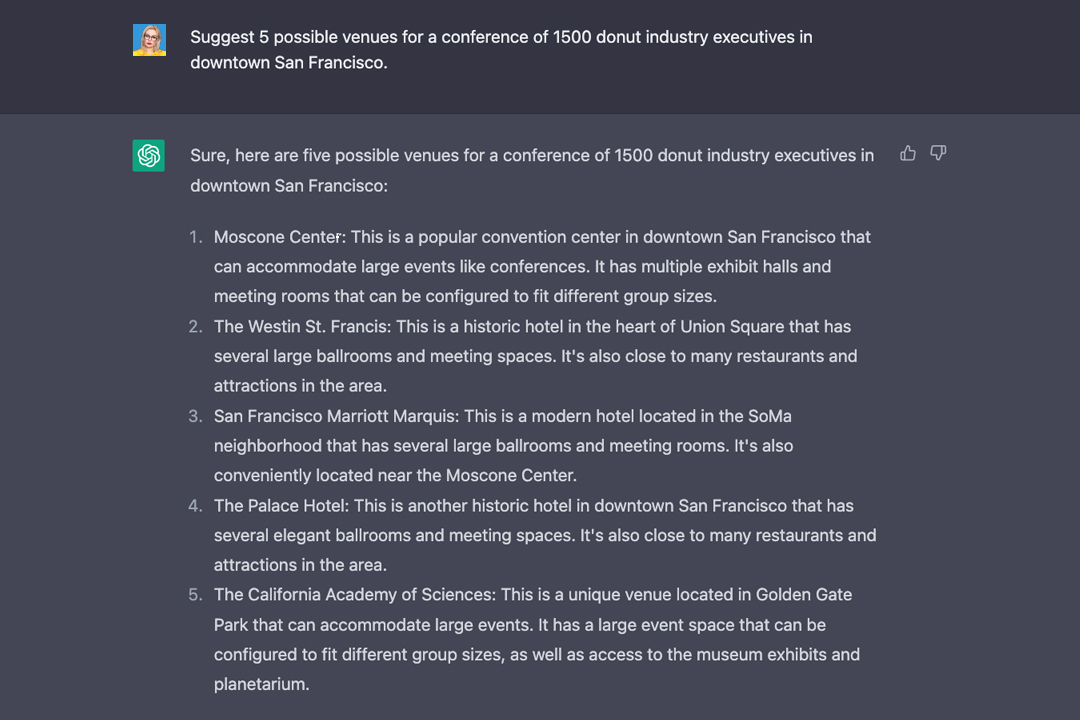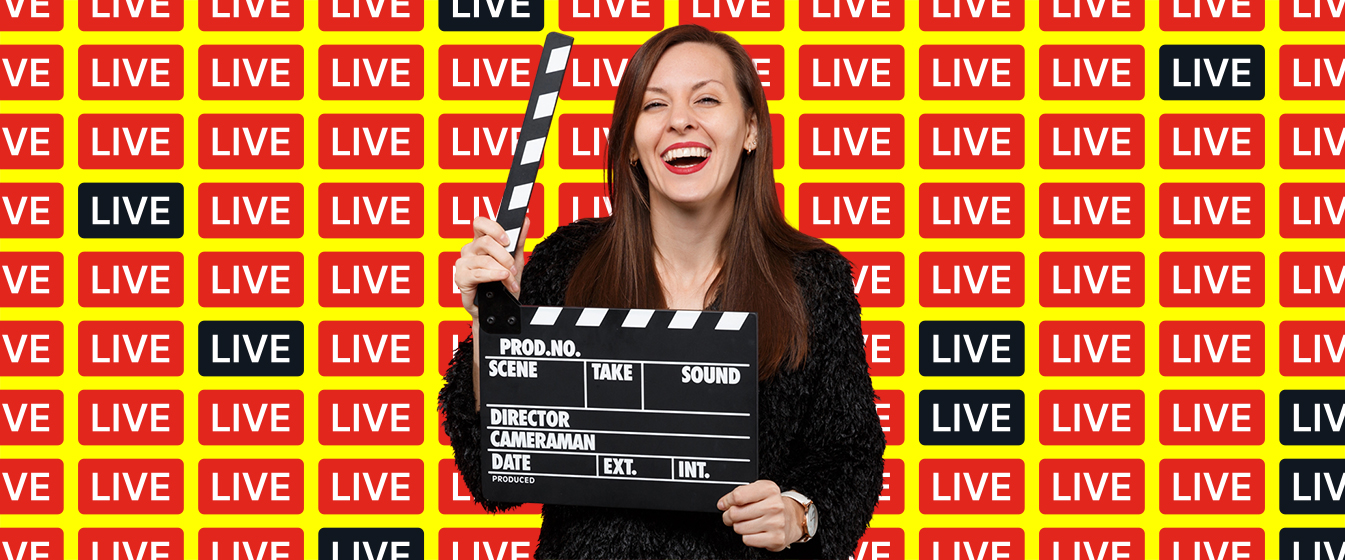Blog: Event management
Nine ways ChatGPT can be useful for event planners
8 March 2023 minute read

Unless you’ve been in prison, outer space or a coma, you can hardly have missed the hype surrounding ChatGPT, the world’s favourite souped-up chatbot.
This AI program can churn out answers to the biggest and smallest questions in life, as well as writing student essays, short stories, haikus and pretty much anything else. It does this by drawing on what it has gleaned from a mind-boggling amount of text on the internet, with careful guidance from human experts.
Following its release in November 2022, ChatGPT has become something of a global phenomenon with people asking it to do all kinds of useful / crazy things, from debugging code to writing a sub-par (but chillingly proficient) rap on the future of meat.
But what could it do for event managers, we wondered?
Well, here are nine things we asked it to do with varying degrees of success.
1 Generate content ideas
ChatGPT can brainstorm content or topic ideas for sessions, panel discussions etc based on as little as a specific keyword. I asked it to come up with topic ideas for a conference about donuts. Yes I am on a diet.

Now, some of the suggestions might not be super-relevant, but you get the general idea. Importantly, you can always give more detail and context if you have it to hand. I could have made it clearer that this was a business conference for executives, bakers etc, focusing on the donut business.
The point is, if you were stuck or wondering whether your coverage of a topic was sufficiently exhaustive, input the right keywords and the AI might well get you started.
You could go further and ask it to write a whole blog post for you. I considered asking it to write this one so I could finish watching season 3 of Succession. But I didn’t. Why? Because you deserve better. Also, Google tends to penalise AI-generated content.
2 Write a marketing email
Maybe we wouldn’t trust it to write a whole blog post, but how are ChatGPT’s marketing copy chops? Judge for yourself:

It’s a little lacking in personality and not terribly original. But honestly? I receive worse marketing emails from humans every week. That is I had assumed they were from humans.
You could also ask it to draft additional, more specific emails for your event marketing campaign:
‘Can you also write a last-chance to register email?’
‘Can you also write an early-bird pricing email?’
‘Can you write an email thanking attendees and letting them know the event’s content is now available on-demand?’
3 Plan social media posts
If you’re struggling to get started with planning your social media posts, ChatGPT can help. Again it’s unlikely that you would take every suggestion and execute it, but it is definitely useful for helping pull your posting plan together, and it might throw in a few ideas you hadn’t thought of.
You often have to prompt more than once to get the kind of response you need.

You might expect that the posting times shown in the screenshot above should be best practices for posting times across social platforms based on the request, but it’s quite likely ChatGPT simply made them up. It makes up a lot of stuff.
4 Write captions and copy for social media posts
So the AI can help schedule your posts. But could it write them for you?
Maybe ChatGPT can save you time here by generating captions for social media posts, or at least provide you with ideas for captions. As always, the more detailed a prompt you give, the better the output will be.
If you want the copy tailored to specific audiences, make sure to provide this information upfront.
Remember to bear in mind that your competitors could be asking ChatGPT the same thing, and that could result in near identical copy, which would not be a good look.
5 Help find an event venue
Now, obviously you have Google for this kind of thing. But in the few brief experiments we did, the AI is a lot quicker and more focused than carrying out manual searches in the traditional way.
Here we asked it to come up with a shortlist of venues in San Francisco.

You could add numerous, more specific criteria (public transport within 5 mins ... max daily delegate rate ... natural light in breakout rooms etc) to get a more targeted outcome.
It’s worth remembering here though that ChatGPT has limited access to information published to the web after 2021. But you can see how it has the potential to save you some time in putting together a consideration set.
6 Identify potential speakers
Who could I approach to be a keynote speaker for my donut conference? Let’s ask the oracle:

These are probably fairly obvious (or at least mainstream) suggestions that may or may not impress the serious donut professional you’re targeting for this event. In most cases you would have superior knowledge of the industry vertical you’re producing for than the AI does.
But quite often event professionals are tasked with developing new meeting agendas in unfamiliar markets or new locations.
On balance, I reckon these results are probably as good as something an intern might come up with after a few hours. ChatGPT came up with it in 7 seconds.
7 Keyword research
Are you setting up a Google AdWords campaign or doing some SEO for your event website?
Type in some of your target keywords to ChatGPT and ask for related ones. ChatGPT will generate a long-list of keywords within a few seconds – way faster than more traditional methods. Chances are it will suggest some tangential ones that you wouldn’t have thought of but that it might pay to include (or actively exclude) from your PPC campaigns.
8 Summarising long-form content
You can upload a long piece of content, like a report, and ask ChatGPT to summarise it. You can even specify how many words you want the summary to be and in what format (for example, bullet points).
This could be handy if you’re looking to generate an abstract for a scientific paper or if you need to make 50 speaker biographies the same length.
But exercise caution. The AI has no real way of evaluating which aspects of the paper are the most important (besides how often they’re mentioned) or which of a person’s accomplishments are most impressive in a speaker bio. There’s every chance key pieces of information will get missed.
9 Fun and exciting ideas for your event format
It’s not always easy to think of novel ways to engage and entertain attendees. Most event professionals would admit to falling back on the same old formats when they run out of ideas. Can ChatGPT suggest anything novel?
Back to Donut World 2023.

Those ideas are a mixed bag. Who the hell has juice with a donut? But even though you might not want to use all (or any) of the ideas it came up with, you can see how – given more focused prompts – the AI would at least be more time-efficient than running your own Google searches manually and ploughing through magazine articles, other peoples’ event brochures etc.
The art of using prompts
Keep your prompts concise, brief and to the point. Try to avoid using unnecessary words or information that will confuse the chatbot or delay the response.
And write your prompts in a way that is easy to understand and uses everyday language. As a general principle, it’s a good idea to:
- Set the context of the situation: ‘Act as ...’
- Describe the information you will provide: ‘I will provide ...’
- State what you expect: ‘You will ...’
Reid Robinson of our integration partner Zapier shared a useful blog on how to write an effective GPT-3 prompt which I would highly recommend if you’re considering using it for anything other than fun.
Other AI chat programs are available
While ChatGPT is rather hogging the limelight at present, it’s not the only AI tool of its kind. There’s the imaginatively titled Chatsonic, GPT-3 Playground, and YouChat. They’re all fundamentally powered by OpenAI’s models, but they behave differently and it’s worth exploring all of them to see which you like best.
Whichever one you use though, it’s important that you don’t rely on AI chatbots as a source of truth. Check anything you’re not sure of.
As we’ve seen, they can be a helpful way of researching around a subject, identifying fresh ideas and speeding up admin tasks. But make sure you are aware of all the risks that go along with these bots.
ChatGPT can’t understand the specifics of your event and it doesn’t know your business and priorities as well as you and your team do.
Also, it makes things up for itself, has no inate idea of context and relies solely on information that other people have published on the internet. And we know how trustworthy the internet is.
Prof Michael Wooldridge, director of foundational AI research at the Alan Turing Institute in London put it better than I could,
‘One of the biggest problems with ChatGPT is that it comes back, very confidently, with falsities. It doesn’t know what’s true or false. It doesn’t know about the world. You should absolutely not trust it. You need to check what it says.’
And now I really want a donut.



